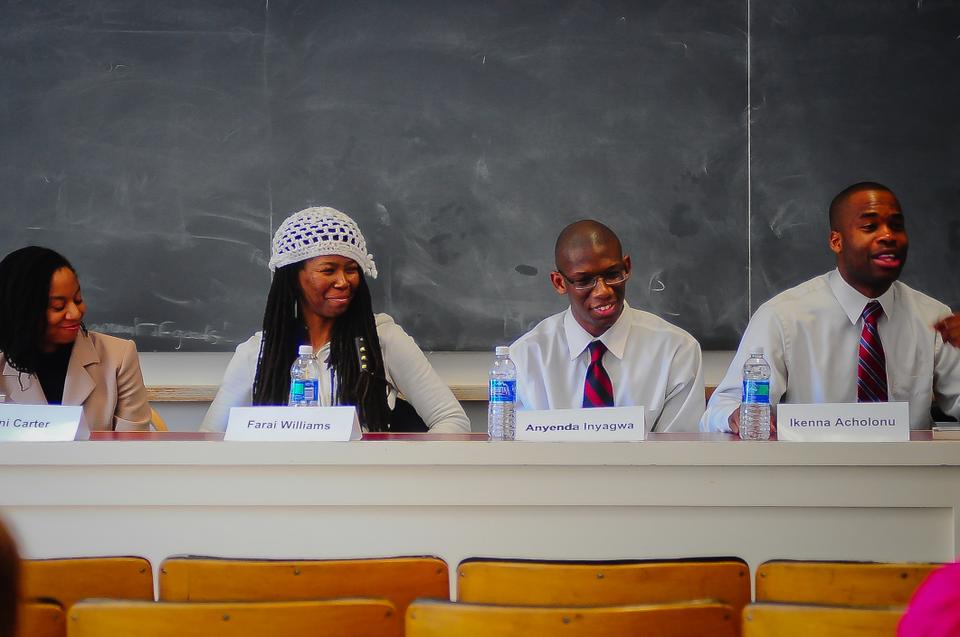
News
Cambridge Residents Slam Council Proposal to Delay Bike Lane Construction

News
‘Gender-Affirming Slay Fest’: Harvard College QSA Hosts Annual Queer Prom

News
‘Not Being Nerds’: Harvard Students Dance to Tinashe at Yardfest

News
Wrongful Death Trial Against CAMHS Employee Over 2015 Student Suicide To Begin Tuesday

News
Cornel West, Harvard Affiliates Call for University to Divest from ‘Israeli Apartheid’ at Rally
Black Arts Festival Aims To Inspire

This year, the Kuumba Singers of Harvard College brought the 14th Annual Walter J. Leonard Black Arts Festival into the greater community with their theme “Living for More Than Just Me.” With funk and compassion, black artists at Harvard put the focus on minority youth in the Boston community, and a large portion of the proceeds from the event were donated to sustaining arts programs for Boston youth. “We’ve seen the impact that [art] has had on our lives, and we know that it can be a positive outlet,” said Amarachi I. Erondu ’15, the financial chair of Kuumba’s Black Arts Festival board. This year, the festival provided a space for young black artists to perform and share their talent.
“In this music that you’re creating, there is no limitation, and you can do whatever you want to do,” said Ikenna Acholonu, a mentor to youth in the Boston area, during the panel discussion at the festival, which ran from Thursday to Saturday. Acholonu reminded students that sometimes society limits the potential of students of color. “You have a lot of stuff stacked against you regardless if you try hard,” he said. He was one of four people who were asked by the Black Arts Festival board to speak about the importance of arts education for minority students. The others were Anyenda Inyagwa, a graduate of Tufts University who now works in various youth programs in Boston; Farai Williams, the artistic director of Project HIP-HOP; and Noni D. Carter ’13, a junior at Harvard whose book “Good Fortune” was published two years ago.
Over three days there were five events, all focused on the same theme. The festival kicked off on Thursday with “Sing it, Sister,” a free event at the Queen’s Head Pub featuring black female vocalists, and ended with a performance on Saturday at the Cabot House Underground Theater featuring black youth from BlackCAST’s Teen Empowerment program, performances from Harvard students from Speak Out Loud, and other monologues by minority students at Harvard. All of the events had a common theme: The arts are an important outlet through which minority students can express themselves freely. “The arts are carriers of cultural memory, and we need to be a part of creating what that is,” Farai Williams said in the panel discussion.
The other speakers present certainly had similar missions in mind. Carter spoke about the impact her book has had on African American students, both in her hometown in Georgia and in Boston public schools, where she has been asked to speak many times. She said that there is a lack of black mentors in our history textbooks, and that part of her mission in educating students through her book was to share her great-great-great grandmother’s slave journey with those around her whom she found to be ashamed of their African American slave history.
The main act was a benefit showcase on Friday at the Roxbury Community College Mainstage Theater. “We’re hoping to fill 500 seats,” said Ada D. Lin ’14, another member of the festival’s board. Lin is from the Boston area, and she benefitted from arts programs in the Boston public schools growing up. These programs lack funding, Lin said, a problem that the showcase aimed to remedy. Kuumba donated most of the proceeds to the Tobin Community Center in Roxbury, an organization that provides after-school arts programs for Boston youth. “The more people you have to look up to, the brighter your future will be,” Lin said.
As such, this year’s Black Arts Festival sought to provide new mentors for Black youth. On Friday, a group from Kuumba ran a workshop for 50 eighth-grade students to talk about Black music and Black History Month in a Roxbury public school. Harvard students shared their experiences and offered themselves as examples of how to express oneself through art. “Growing up I never had black mentors,” Acholonu said. “The first black mentors I received were in college.”
The Black Arts Festival hopes to establish a pattern of giving back to the community. “It’s our responsibility to continue inspiring and uplifting,” Carter said. By collaborating with other black organizations on campus, the Black Arts Festival highlighted the necessity of role models for youth and the importance of keeping art in public schools. Kuumba hopes to continue this mission by providing Boston youth with a continued outlet for expression and will keep this mission in mind when brainstorming themes for next year’s Black Arts Festival.
—Staff writer Virginia R. Marshall can be reached at virginiarosemarshall@college.harvard.edu.
Want to keep up with breaking news? Subscribe to our email newsletter.
